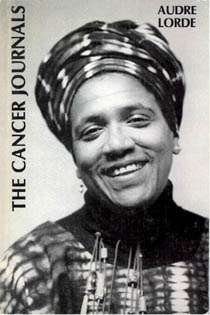The Cancer Journals
 | |
| Author | Audre Lorde |
|---|---|
| Country | United States |
| Language | English |
| Genre | Non-fiction |
| Publisher | Aunt Lute Books |
Publication date | 1980 |
| Media type | Print (Hardback & Paperback) |
| Pages | 77 |
The Cancer Journals is a 1980 book of non-fiction by Audre Lorde. It deals with her struggle with breast cancer.
Summary
The book consists of an introduction and three chapters, each featuring passages from her diary.
The first chapter, 'The Transformation of Silence into Language and Action' is a speech first given on December 28, 1977 at the Lesbian and Literature Panel of the Modern Language Association.[1] Starting with an excerpt from The Black Unicorn, Lorde calls on the reader to relinquish silence and speak out.
The second chapter, 'Breast Cancer: A Black Lesbian Feminist Experience', is a day-to-day account of her cancer experience, from biopsy to mastectomy. Lorde focuses on the importance of the love received from the women around her throughout her experience. She also harbours her solace at talking about it with other lesbian cancer survivors. Further, she mentions her refusal to wear a silicon breast after the operation.
In the third chapter, 'Breast Cancer: Power vs. Prosthesis', Lorde dwells on her coming to terms with the outcome of her mastectomy. Lorde speaks about the counseling procedures that take place in the aftermath of the surgery via the American Cancer Society’s Reach for Recovery Program and their insistence on the breast prosthesis. She argues that the program, while doing work under the guise of “good” and “recovery,” actually reinforced a kind of misogynist nostalgia. She explains that although it is fine for women to resort to a breast prosthesis if they wanted to, the options seems like a cover-up in a society where women are solely judged by and reduced to their looks.[2] Lorde understands the “cosmetic” focus of the Reach for Recovery program as part of a general problem of sexism and racism. She also speaks of the possibilities of alternative medicine, arguing that women should be afforded to space to look at all options, and negotiate treatment and healing on their own terms.